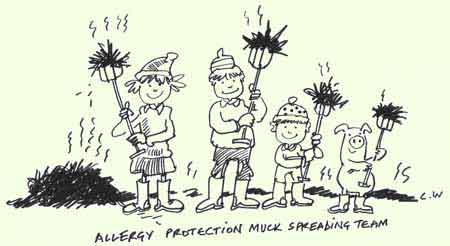|
|
The consumption of fish in infancy and living on a farm both signficantly reduce the incidence of allergic disease in children |
In studies of more than 8000 families in Western Sweden since 2003, Dr Emma Goksör from the University of Gothenburg has found that children who ate fish before the age of nine months had less allergic rhinitis (sneezing and runny nose) at age 4.5 years old than children who did not eat fish before the age of nine months. The families answered questionnaires about the babies aged six and 12 months, and nearly 4,500 of them completed another questionnaire when the children were 4.5 years old to determine risk and protective factors for rhinitis. The analysis took the parents’ own allergies, lifestyle and their children’s early feeding patterns into account. At 4.5 years old, one in 20 children reported symptoms of allergic rhinitis during the previous year. Allergic rhinitis was only half as common in children who received fish before the age of nine months compared to those who did not eat fish until later. “We found that parents who gave their children fish during the first nine months of life appear to reduce the risk of allergies in the child,” she said today at the congress of the European Academy of Allergy and Clinical Immunology congress in London. The percentage of children statistically attributable to late fish introduction, that is introduction after the age of nine months, is about 10%. That is, if all children were introduced to fish before the age of nine months, every tenth case of allergic rhinitis at preschool age could be avoided, according to this study. It is not known why fish has a protective effect against allergies, but research suggests that the composition of fat intake influences the child’s response to allergens. Solid food in the first year of life helps to kick start the gut and the body to develop its immune system and inflammatory responses and eating fish by the age of nine months is particularly beneficial. “There is no rationale for delaying the introduction of solids into a baby’s diet,” said Dr Goksör. “Don’t wait too long too long to give fish to a baby as we believe that it could help reduce the risk of allergies and eczema later in life.”
With the rise in asthma and allergies in the last decade, Dr Sabina Illi at the University of Munich in Germany, has also been looking for reasons why. “Traditional small family farms where children play in the stables and go with their parents into the barns provide a protective environment against allergies and asthma,” she said. Even before birth, exposure to hay, straw and animals that typically cause hay fever or asthma may act as a natural form of immunotherapy in the first three years of life. The protective effects were seen not only in children who live on a farm, but also in those exposed to farming though not living on a farm themselves. Her research divided 34,500 children aged six to 12 years into groups who lived on a farm, who were exposed to farming environment though not living on a farm or who had no contact with a farm in rural areas of Germany, Switzerland and Austria. Dr Illi found that the rate of allergies in children who had no contact with a farm was two thirds greater than in children who lived on or who were exposed to a farm. It is not clear yet, however, how much exposure to a farm a pregnant woman or a child needs, or whether it is farm animals or their fodder or the combination of the two that improves immunity. Previous studies by the same group suggest that T cells in the body that regulate the immune response are activated, and pro-allergic cytokines (specific communication cells involved in inflammation) are decreased. This co-ordinated biological response influences the risk of developing allergy. The research team found that the quantity and activity of the T cells and cytokines were passed on to babies whose mothers had exposure to a farming environment during pregnancy. Recently, Dr Illi and her team have analysed 400 dust samples from these children’s bedrooms and found specific fungi and bacteria present in the dust to be protective against asthma and allergy. “Our goal is to identify agents that exert protection to develop preventive measures for children in urban areas in the future. We cannot yet translate our findings for pregnant mums in the city,” she added. It could be argued that allergic people move to the city to avoid contact with hay and animals which could in part explain the prevalence of urban versus rural allergies, but the beneficial effects of a farm environment are seen even in children whose parents are not farmers. Both studies represent a major step forward in understanding how to prevent asthma and allergy. They show that it is possible for diet and environment to influence a child’s development and long-term health quite profoundly. Early introduction of fish decreases the risk of eczema in infants Alm et al Archive of Disease in Childhood. – Dr Emma Goksör, Department of Paediatrics, University of Gothenburg, Sweden emma.goksor@pediat.gu.se Maternal farm exposure modulates neonatal immune mechanisms through regulatory T cells B. Schaub, J. Liu, S. Höppler, I. Schleich, J. Huehn, S. Olek, G. EAACI press release First published in June 2010 |











